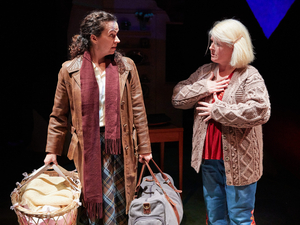Review: MY MOTHER SAID I NEVER SHOULD, Crucible Studio, Sheffield

![]() The Sheffield Theatres/Fingersmiths production of My Mother Said I Never Should takes Charlotte Keatley's well-loved play and reinvents it through the experience of D/deaf women.
The Sheffield Theatres/Fingersmiths production of My Mother Said I Never Should takes Charlotte Keatley's well-loved play and reinvents it through the experience of D/deaf women.
The play tells the story of four different generations of women in one family through most of the 20th century. All four actors do a wonderful job at creating very distinctive characters who all feel real and relatable. They have a huge job in not only taking on sizeable roles, but also delivering lines via signing and speech simultaneously most of the time.
As the youngest character, Rosie, Lisa Kelly gives a charismatic and energetic performance - very assured for her professional stage debut. Ali Briggs and Jude Mahon play Doris and Margaret, the matriarchs of the family whose own mother-daughter relationship is complex and somewhat strained, and who are engaged in a constant power struggle both with each other and with the next generations. At the heart of it all is EJ Raymond's Jackie, and the strain put on her and the rest of the family when she gives her baby, Rosie, to her mother to raise.
The production utilises a range of communication techniques - recorded voiceovers, sign language, subtitles, and traditional spoken lines - to deliver the script. There are also brief moments where auditory lines exclude a deaf audience and signed ones exclude a hearing one, exemplifying the way that communication between characters is a mixture of what is said and what is unsaid, what is heard and what is missed.
Whilst all these techniques can be effective in their place, what slightly jars is that it is never really clear why each particular mode of delivery is being adopted at any given time. There may well have been directorial reasons why certain passages were chosen to be delivered via recorded voiceover, others via silent sign language and so forth, but it's not very clear to the audience what those reasons were. I found this sometimes took me out of the action as I was trying to analyse why the mode of delivery had changed when it did.
The themes of the play - childhood vs adulthood, generational trauma, dreams vs duty - are well realised not only in the performances, but in a set that blends the domestic and the playful: a carpet turns into a hill that children run up and down, a piano becomes a blackboard, and a kite becomes a screen carrying subtitles.
The visual design is clever, although there are other creative flourishes such as the use of pop music to indicate time period, and some overly extended playtime sequences, that feel a little superfluous and extend an already too-long running time (the show runs to 2h 45m including interval - with a 7:45pm start for the evening shows, it makes for a very late night, and one that might alienate some of the potential audience).
Whilst it has its flaws, there is still a lot to like about this production - a creative set, a talented cast, and a story that still resonates over 30 years since it was written.
My Mother Said I Never Should is at the Crucible Studio, Sheffield, until 23 November.
Photo by Mark Douet.
Reader Reviews

Videos

